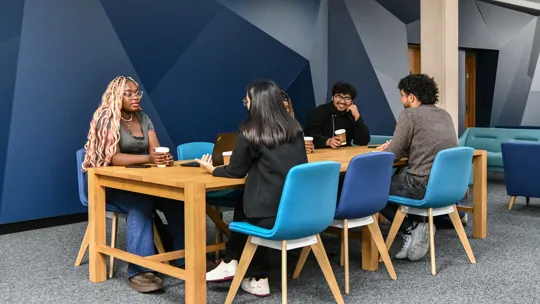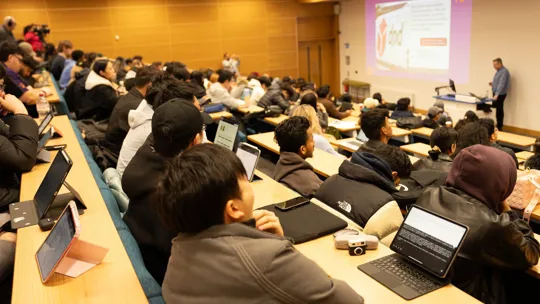February 2024
Blog | How my chef apprenticeship took me to the South Pole
By Killoran Wills and Melanie Hall
Share post:Read time: approx 6 mins
While cheffing can take you anywhere in the world, few have pushed the boundaries as far as former University College Birmingham apprentice Patrick White, who now works at Birmingham's Tropea, one of the Good Food Guide’s 100 Best Local Restaurants 2023. Read about his amazing journey to the South Pole…
Patrick White learned his craft on the Royal Academy of Culinary Arts apprenticeship scheme, which was “tough”, but a fantastic opportunity made possible by his restaurant employer and University College Birmingham as the chosen 'off-the-job' training provider.
One thing that kept him going when the heat in the kitchen cranked up was a vision of adventure in cool, colder climes. Because, on his regular train commute to Stourbridge, he had followed a series about chefs working in extreme locations. One of those was places was Antarctica, and Patrick was smitten.
Once he had completed his Level 3 apprenticeship, he honed his culinary skills further by working in a traditional Italian restaurant and then Harborne Kitchen before, six years later, applying for his dream job with the British Antarctic Survey.

The British Antarctic Survey base in Rothera
Icebergs and then... white
Getting to the South Pole was not straightforward. Patrick travelled first to Cambridge for two weeks of training that included familiarisation and First Aid, then endured a 36-hour journey via Sao Paulo and Santiago, which saw Patrick some seven hours away from basic hospital care should he have needed it. The last leg of the journey is etched in Patrick’s memory.
“It was incredibly exciting,” said Patrick, now 27. “As the Dash 7 plane neared Rothera station, I could see icebergs and then white. Everything was white - with a tiny bit of station and an airstrip.”
Patrick stayed at Rothera during the summer months so temperatures were a “mild” minus five degrees – a benefit of the dry cold air. But the rarified atmosphere also wiped out any sense of smell.
“When I sailed back via the Falklands on board the RRS Sir David Attenborough, the smell of vegetation was a real attack on the senses,” he said.

Feeding scientists and students
It wasn’t the only thing he had to get used to. Supplies to the station were largely tinned or frozen, requiring a little ingenuity to provide three meals a day for up to 150 scientists, conservationists, research students and support staff.
It was a huge responsibility for the team of four chefs as they were reminded that morale was largely down to the food on everyone’s plate. “Food is the morale maker on station,” he said. “If the food is bad, it gets everyone down.”
It was largely home cooking on a bigger scale such as lamb stew and dumplings, curry and fish and chips, but Patrick was keen to make Saturdays that little bit special with more of a fine dining menu. “I did a beef wellington, but had to improvise, using canned mushrooms for the duxelle enhanced with a few dried mushrooms. I also made a dauphinoise using tinned potatoes.”
The ingredients he most missed were citrus fruits, fresh herbs and good quality cooking chocolate. But there were benefits too.
For the first time in the industry, Patrick enjoyed a regular five-day week and made the most of time off going out on the research boats, skiing and exploring the perimeter of the base. He went on island drop-offs and had the chance to see penguins, seals and whales at close quarters.
“It is not for everyone though,” he said. “Some might struggle with the control and regimentation that is necessary to maintain safety – for example signing in and out and not going out of sight of the station. A simple slip could have serious consequences.”
Patrick enjoyed the strong sense of community at the station and was sad to leave. “I would like to go back, perhaps in the winter when there are just 20 people at the station and it’s dark and snowing.”
In the meantime, he has his sights on somewhere a little warmer – Australia - then possibly Canada. “My big takeaway from my course is that being a chef can take you anywhere in the world,” he said.

Interested in our apprenticeships?
Patrick is just one apprentice to carve out an extraordinary career, choosing the apprenticeship route to combine gaining a well-respected industry qualification with getting paid in a job you love.
Poppy O'Toole is another hugely successful former apprentice, going on to have over three million followers across platforms and over 400 million views across her channels. She has also cooked with Michel Roux Jr and co-hosts BBC Three’s Young MasterChef.
But we don't only do cookery apprenticeships, not by a long shot. Our programmes go right up to postgraduate Level 7 in everything from nursing to business management.
Interested? Find out how we can work with your employer to get you upskilled in the perfect apprenticeship for you.
Check out our latest news stories

University welcomes MP to explore city-wide opportunities for young people
Preet Gill MP joins UCB staff on campus tour, exploring how her Edgbaston constituents could benefit from UCB's prov…
Read more
Chelmsley Starters and Bluebell Wood officially opened by Saqib Bhatti MP
Saqib Bhatti MP joins other guests and VIPs at the official opening event for the Chelmsley Starters culinary school…
Read more
Contextual admissions – your personal path to progress
University College Birmingham launches it's contextual offers scheme, widening participation for under-represented students.
Read more
Business students travel to infinity in Global Entrepreneurship Week conference
The theme of this year's student learning conference could scarcely have been more relevant.
Read more
Chelmsley Wood's Bluebell Wood eatery welcomes high-profile visitors
Bluebell Wood welcomes high-profile guests and the highest environmental health rating of 5.
Read more
University’s Guild of Students officers add their voice to national debate
UCB Guild of Students join a national debate on the post-16 white paper.
Read more








